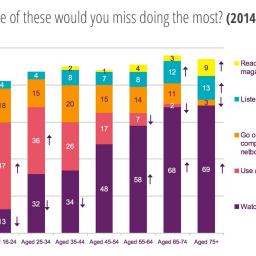Someone over at the US House of Representatives - or maybe a group of someones - has made such a nuisance editing Wikipedia that
Wikipedia's administration has applied a ten day ban on all anonymous edits at the site. What precipitated the ban was not edits to articles about jam bands and their fans' favorite foods, but rather a series of more creative edits that suggested that, among other things, Cuban spies orchestrated the assassination of JFK and a race of hyper-intelligent extra-terrestrial lizardmen has infiltrated the U.S. government, Mediaite said. ... ome staffers are upset about the ban and took to Wikipedia to complain. "Out of over 9000 staffers in the House, should we really be banning this whole IP range based on the actions of two or three? Some of use here are just making grammatical edits, adding information about birds in Omsk, or showing how one can patch KDE2 under FreeBSD," said one staffer from the House's IP address.
Important take-away conclusions from this article:
1. House Representatives or their staffers are spending way too much time on Wikipedia.
2. The Twitterbot and Wikipedia oversight have been useful and shed light on what's going on.
But most importantly:
3. Holy crap: the House of Reps is running KDE2 on FreeBSD!

At its core, it's a question of quantity versus quality, or the right to access information. But it's also a question about the role humans should play in an ostensibly human-edited encyclopedia. Here not to provoke those questions but simply to add information to
Wikipedia is a Swede by the name of Sverker Johansson. He is single-handedly responsible for 2.7 million articles on wikipedia (8.5% of the entire site).
But 'single-handedly' isn't quite right: he wrote and deploys a bot.
Mr. Johansson's program scrubs databases and other digital sources for information, and then packages it into an article. On a good day, he says his "Lsjbot" creates up to 10,000 new entries. On Wikipedia, any registered user can create an entry. Mr. Johansson has to find a reliable database, create a template for a given subject and then launch his bot from his computer. The software program searches for information, then publishes it to Wikipedia.
Bots have long been used to author and edit entries on Wikipedia, and, more recently, an increasingly large amount of the site's new content is written by bots. Their use is regulated by Wikipedia users called the "Bot Approvals Group." While Mr. Johansson works to achieve consensus approval for his project, he and his bot-loving peers expect to continue facing resistance. "There is a vocal minority who don't like it," he said during a recent speech on his work. Still, he soldiers on.
Complex questions are at play here: is it better Wikipedia lack articles that humans can't or won't write? Can robot-written articles be trusted? Should they be labeled and approved? What kind of criteria would be applied and who would fund/oversee this kind of oversight body? And lastly: is all this work even worth it in the first place? Do these bot-written articles even add any value to everyone's favorite information site?
More coverage at
Business Spectator (Australia) and
Popular Science.

If the tech market experienced a bit of a downturn not long ago, it would now seem it's on the rebound, and investors are looking for the next dot-com miracle. The proof? Stocks like this one.
Check out the CYNK stock, linked to a company called Introbiz.
Registered in Belize, chartered in Nevada, one employee, totally opaque financial statements. Zero revenue, $1.5M in operating losses. No assets. And yet,
the stock is up 25,000% from $0.10 to $14 per share in the last 16 days.What does the site do? Looks like an ersatz social networking firm with a vague charter of connecting you to famous people. No idea how, who, or where. This is a bubble at its finest, and you know what they say about a fool and his money ...

Bad news for the little browser that could: not only is Firefox no longer a "little browser" but it is increasingly having trouble competing. Back in 2009, Firefox was on the rise. But now, not only is Chrome eating its lunch but Firefox's user share is actually slipping.
Netmarketshare provides the data and
SJVN provides the analysis/funeral rites. He suggests:
For Firefox to remain a web browser power, it needs to make big improvements and it needs to make them now. Otherwise, Firefox may yet follow its predecessor Netscape into the web's past.
[ed. note: as a steadfast Opera user since 2000, this is all fascinating. Opera seems pegged-for-life at 3%]
As of 2014 the Australian Government requires all tax payers using electronic tax return software to first register with the new myGov registry. myGov was introduced recently as a single signon for Australian government services.
Technical issues with myGov have prevented online tax lodgement using ATO software resulting in unhappy tax payers venting on social media.
myGov is the Department of Human Services system which was
recently demonstrated to have a security flaw which exposed private health and family information.
Wow - This is big.
The New York Times has selected the folks from Mozilla to develop their new comment and contribution system.
The New York Times and The Washington Post announced on Thursday that they had teamed up with Mozilla to develop a new platform that will allow them to better manage their readers' online comments and contributions. The platform will be supported by a grant of roughly $3.9 million from the John S. and James L. Knight Foundation, an organization that gives substantial money to promote journalism innovation.
Mozilla, the maker of the Firefox web browser and a nonprofit that works for open standards on the web, will help The Times and The Post build the technology for a platform tailored to news organizations. The platform, which will take approximately two years to complete, will eventually be available for other news organization to download free.
Looks like opportunity in many senses: a chance to rethink online commenting, a chance for Mozilla to make a buck, and a chance to put an axe in the head of "Sign into Facebook to comment" type approaches. Me, I would've recommended they install
Pipecode. But hey.
You might remember Freshmeat, a hacker site whose name was changed in 2011 to FreeCode (to me, it will always be Freshmeat). Freshmeat kept track of software packages, their newest versions, change logs, and updates. For project developers, it was a great way to get the word out about improvements to their software. For users, it was a spectacular way to search for and discover interesting and useful software. While not totally devoted to open source software, the bulk of the software was for Unix and Linux systems, and much of it was open source.
In 2012, FreeCode was bought by Dice Holdings, along with Slashdot and the rest of Geeknet's sites, for $20M. Two years later (ie, yesterday),
it was dead in the water.
As of yesterday, visitors to Freecode.com will see "Effective 2014-06-18 Freecode is no longer being updated (content may be stale)." Turns out, Freecode.com wasn't generating enough revenue via page impressions of ads, and Dice Holdings decided to stick a knife in its heart, explaining:
The Freecode site has been moved to a static state effective June 18, 2014 due to low traffic levels and so that folks will focus on more useful endeavors than site upkeep. The site contents have been retained in this static state as a continued path to access the linked software, much of which is on self-hosted servers and would be difficult to find otherwise.
It might seem better than nothing to just freeze FreeCode into a static site, but a site whose purpose is to track the latest and greatest is dead in the water if all of its information was frozen on 18 June. Rest in Peace, Freshmeat. [ed. note: Is it now rotten meat? Because I see flies on the carcass].

Mozilla's proposed CEO, Eich, departed due to his support of an anti-gay marriage proposition in California. But since then, nothing has changed, and Mozilla is
desperately in need of some leadership at a time when its $300M/year deal with Google is coming to an end (Dec 2014, to be precise). Writes Steven J. Vaughan-Nichols:
Today, months later, under the temporary leadership of acting CEO Chris Beard, Mozilla doesn't appear to be any closer to finding a new CEO.
In a June 3 blog posting, Surman wrote that one of the things on the top of his mind is "Finding the right balance between clear goals, working across teams and distributed leadership. If I'm honest, we've struggled with these things at [Mozilla] for the last 18 months or so. Our recent all hands in San Francisco felt like a breakthrough: focused, problem-solving, fast moving." How this will translate into true leadership remains an unanswered question.
What next for embattled Mozilla? And how to prevent the once mighty browser-giant from becoming the next Netscape?

Three months ago an internal strategy memo entitled
The New York Times Innovation Report , detailing the challenges facing the NYT and its competitors in the digital age, appeared on the web; the leak was inevitable since the report was distributed to employees.
The report began with the statement 'The New York Times is winning at journalism. Of all the challenges... producing great journalism is the hardest.'
But then came the counterpoint: 'At the same time, we are falling behind in a second critical area: the art and science of getting our journalism to readers... we haven't done enough to crack that code in the digital era.' It noted that in terms of digital traffic, the Times was falling behind both digital-focus journalism operations such as the Huffington Post and Vox Media (SB Nation, the Verge), as well as traditional competitors including the Washington Post (now owned by Amazon's Bezos) and the Wall Street Journal.
Media business blogger Thomas Baekdal has just posted his reaction to the report,
challenging the assertion that the Times was 'winning at journalism' . While the individual stories appearing in the Times may meet high standards of reporting and editing, what if the problem was that readers didn't find the stories relevant to their lives?
Baekdal compares the Times and other newspapers to supermarkets like Wal-Mart, which market huge arrays of products, of which only a small percentage has relevance to any given shopper. While Baekdal acknowledges that Amazon and others have succeeded with supermarket models on the web, they generally do so by using search as entry points into targeted delivery ('Customers who browsed this item also were interested in...'). Another successful model is the community of interest model from social networking; people return each day to read or view a stream of content on topics, or from authors, that matter to them.
[2014-06-16 08:59UTC Minor formatting edits for readability.]

May 18th is international
Bitcoin Pizza Day . From ABC:
The first Bitcoin transaction, according to Internet lore, was for two Papa John's pizzas delivered to a guy in Florida named Laszlo Hanyecz, who ponied up 10,000 bitcoin (about $30) in exchange for the pies.
"It was a good pizza," Hanyecz, 32, told ABC News today.
More than one company is now trying to
make a big deal out of Bitcoin Pizza Day to drum up some business, increase demand for Bitcoins, and sell pizza. Eat a nice, cheesy slice while you ponder the ramifications of
Gitchain , the "unholy matrimony of Bitcoin and Github." With weird science like this,
Cthulhu can only be days away ...





